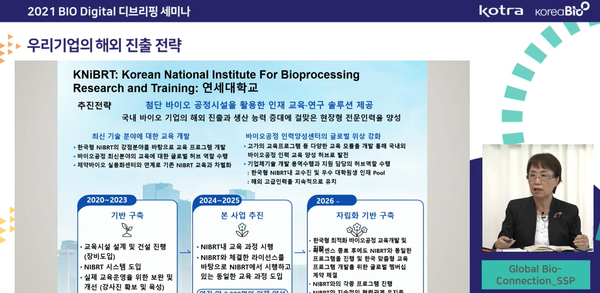Koreans are good at conducting research but do not seem to know well how to develop drugs using such research results, an expert pointed out Thursday.
Suhr Sung-ae, CEO of Global Bio-Connection SSP, a firm providing consulting services for drug development based in California, also said Korea should try to create an environment fit for studies to foster more researchers in the biotechnology industry to compete with other nations in the future.

“Korean researchers are quite talented at the study itself but are relatively weak in using the results to find ways to develop new drugs,” she said.
At an online event co-hosted by Korea Biotechnology Industry Organization (KBIO) and Korea Trade-Investment Promotion Agency (KOTRA), Suhr pointed out that the domestic biopharmaceutical companies would have to compete mainly with rivals in China and India and other nations with global drug developers.
Suhr studied biotechnology in the U.S. and worked at Amgen as a principal scientist for 20 years until Samsung Bioepis recruited her in 2017.
“The biggest thing I felt while working in Korea was that there are so many rising bio ventures, but they could not find enough talented researchers.”
She cited the example of India, which started to focus on fostering elite education, and the Indian Institute of Technology Delhi established a department dedicated to the biotechnology field to nurture talented pupils.
She pointed out that the nation cannot accurately predict how the bio-industry will change in the future as the global society enters the rapidly evolving fourth industrial revolution, which is why the government should provide academic environments for students to study freely.
In addition to the national educational systems for students specializing in bio-industry, Suhr also suggested the domestic companies and ventures look for ways to team up with big global pharmaceutical companies.
“Global pharmaceuticals search for innovative firms, and they are mostly ready to pay for the promising studies,” Suhr said. “Global drug developers like Amgen, Bayer, Pfizer, Genetech, Johnson and Johnson, are the good examples of looking for opportunities to develop various health sectors, including oncology, bone health, inflammation, digital healthcare, and immunology.”
KBIO and KOTRA have been running the Korean pavilion at the Bio USA, one of the world's largest bio exhibitions, since 2009. This year’s event was held from June 14-18. The two organizations held the online debriefing to convey the core contents of the exhibition to Korean companies unable to attend the U.S. event.

